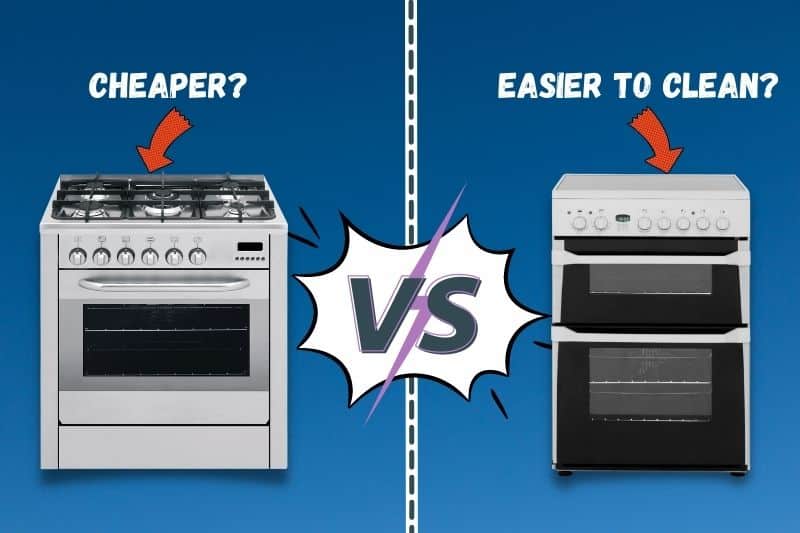Which is better, a gas cooker or an electric cooker? It’s an age-old debate and, as with most things in life, there is no simple answer to this question. The truth is that it depends on several things.
Each appliance has its own set of advantages and disadvantages. The real question is which type of cooker is best suited to your situation, your needs, and preferences.
What Is the Difference Between Gas Cookers and Electric Cookers?
The main difference between the two types of cookers is how they are fuelled. Basically, gas cookers are fuelled by natural gas whilst electric cookers are run with electricity.
Although these appliances are essentially the same, the source of their fuel impacts the way they run. This, in turn, affects the way our food is cooked.
The appearance of the two types of cookers varies. Both gas and electric cookers come in a wide variety of styles and appearances.
Most brands of cookers will offer finishes in white, black and stainless steel. The biggest difference between the appearance of the two types of cookers is the hob.
Gas cookers have raised rings and burners with grates above to rest the pots and pans on. Electric cookers, on the other hand, can come in two forms. The first type of electric cooker has raised or visible coils. With the second type, the coils are hidden under a ceramic glass top.
To get a better idea of what gas cookers and electric cookers entail and offer, we have compiled a list of their pros and cons. This will aid your understanding of the two kinds of cookers by detailing their exact benefits and disadvantages.
Gas Cookers
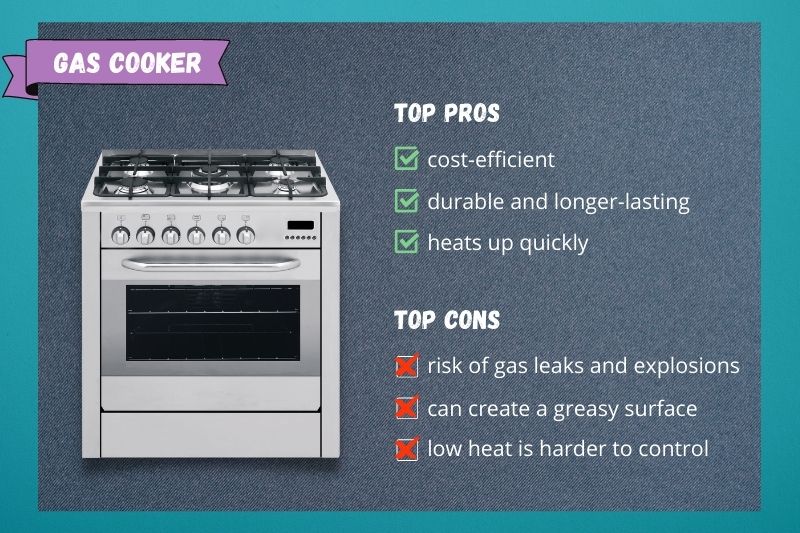
Gas cookers require a gas line in order to run. Although most houses come standard with a gas line to the kitchen, some do not. Adding a gas line to your kitchen (if you don’t already have one) will be an additional expense if you choose a gas cooker.
Gas cookers are durable and more cost-efficient, with lower running costs. They also heat up quickly and offer better heat control and precision.
The downside to gas cookers is that they are not as safe. They run the risk of a gas leak and in severe cases, explosions. Cooking with gas also means you will be working with an open flame. This increases the risk of accidental fires.
Pros
- Ignites quickly
- Heats up quickly
- Burner cools down quickly
- Durable and longer-lasting
- Ideal for simmering
- Cost-effective
- Instant heat control
- Works well with various types of pots and pans
- Lower risk of burns after the burner has been shut off
- Works during power outages
- Constant flame
- Cooks food evenly and quickly
- The grates are removable to allow for easy cleaning
- Can flambé
Cons
- Gas can create a greasy surface
- They are not as easy to turn on
- Burners may not always light
- The burner flame may sometimes be weak
- There is a risk of gas leaks and explosions
- Low heat is harder to control
- Can be more expensive to install if you do not already have a gas line
Electric Cookers
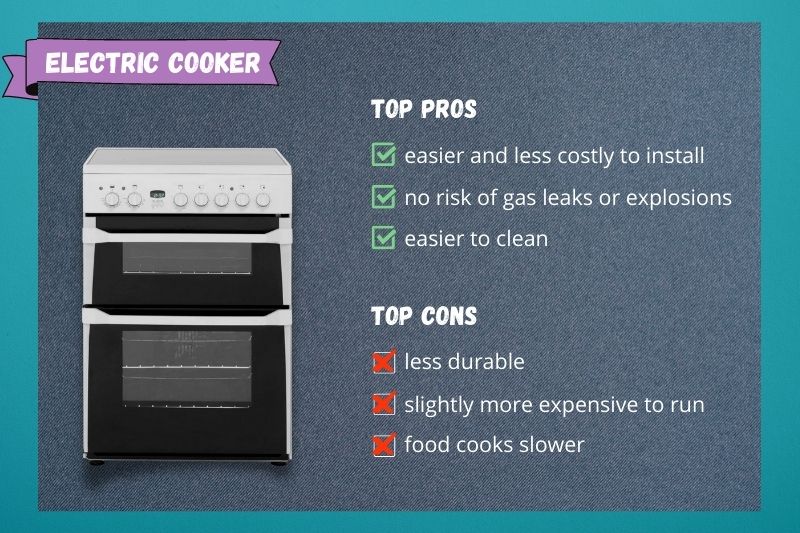
Electric cookers can be run in all houses as they depend on electricity to operate. This also makes them easy to install. Electric cookers are safer as they do not run the risk of leaks, explosions, or open flames.
These cookers are not as cost-efficient to run but can be considerably cheaper to install. When turning them on, there is less likely to be a fault.
This contrasts with gas burners, which can be hard to light. Some people may prefer the sleek appearance of a glass electric hob. They are simple and modern and much easier to clean.
Electric cookers offer a more stable surface to work on. They are also easy to operate and use.
Pros
- Works well at low temperatures
- Kitchen stays cooler
- Flat surface is easier to clean
- Flat surface is more stable for cookware
- Easier to turn on and off
- Easier and less costly to install
- Exact amount of heat is easier to control
- No risk of gas leaks or explosions
- Fast boiling
- Evenly distributes heat
Cons
- Less durable
- Adjustment to temperature difference is slow
- Heats slowly
- Slightly more expensive to run
- Easier to burn yourself as cool down takes longer
- Does not work without power
- Dropping something on it can damage the cooktop
- Food cooks slower
How Much Does Each Cooker Cost?
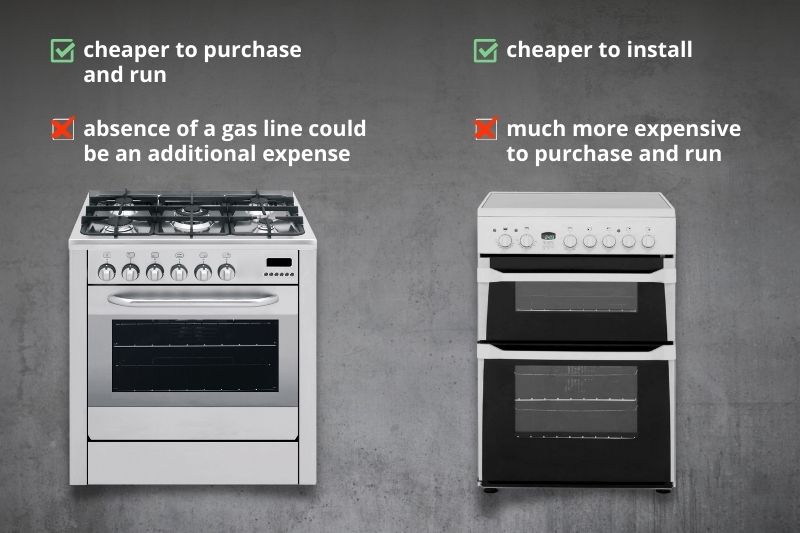
There are a few things to consider when determining what a gas or electric cooker is going to cost. The first thing to consider is the cost of the appliance itself. Gas cookers are typically cheaper to purchase than electric cookers.
The next thing to consider is running costs. Gas cookers require a gas line whilst electric cookers require a power outlet to plug into.
Whilst all homes are connected to the electrical grid, not all houses have gas lines in the kitchen. If your kitchen doesn’t already have a gas line, getting one installed would be an additional expense.
The final expense to consider is the cost to run the cooker. Several studies have determined that electric cookers are much more expensive to run than gas cookers.
All things considered, gas cookers are cheaper to purchase and run than electric cookers.
Which Cooker Is Easier to Clean?
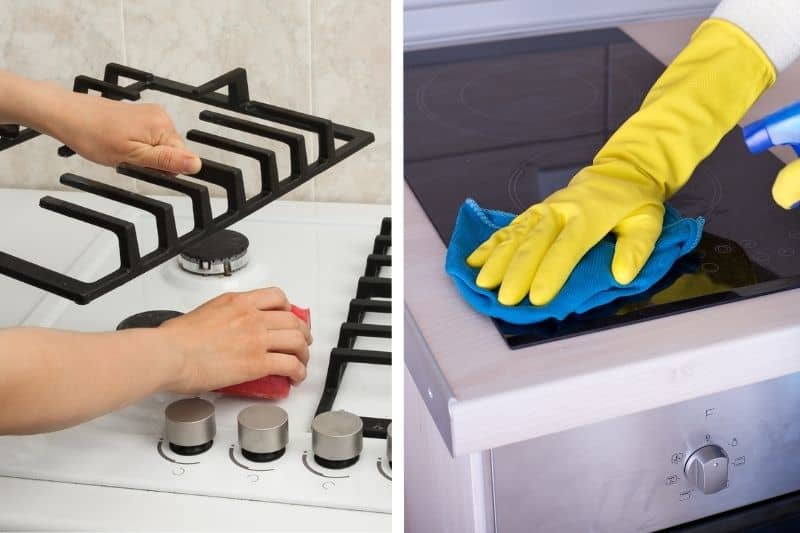
Despite having removable grates, gas cookers can be difficult to clean. While the area underneath the grate is easy to keep clean, cleaning around the burner can be a pain.
Electric cookers with glass tops are considerably easier to maintain and keep clean. Even the toughest of spills are fairly easy to clean.
Electric cookers with exposed coils, however, can be just as difficult to clean as gas cookers. Although the coils on some cookers may be removable, they can prove difficult to clean in between.
Durability
Overall, electric cookers have been found to be less durable than gas cookers. Gas cookers tend to last longer than electric cookers and therefore win the prize in this category.
Safety
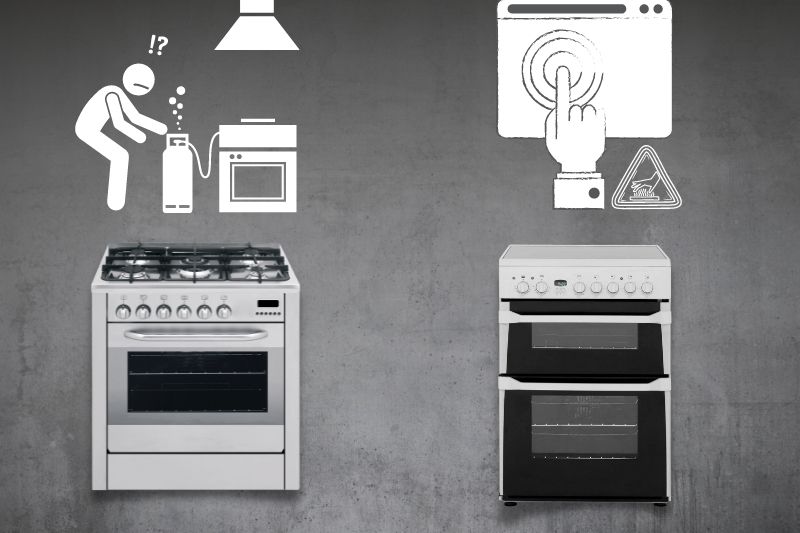
Both gas and electric cookers have their own safety concerns. While gas cookers run the risk of gas leaks, fires and explosions, electric cookers are not without risks.
You’re much more likely to burn yourself on a conventional (non-induction) electric cooker as it is not always easy to tell if they are on. Additionally, they take longer to cool down and are more likely to cause accidental burns than gas cookers.
Where safety is concerned neither cooker is better than the other. They both have safety concerns and should be worked with carefully and with constant caution.
What About Dual-Fuel Cookers?
Dual-fuel cookers are essentially the best of both worlds. They come equipped with a gas hob and an electric oven. Depending on your needs and preferences, they may be the solution to your problem.
Because they use both gas and electricity to operate, they cost a considerable amount of money to run. The overall monthly expense will depend on your usage of each fuel system.
How to Choose Between Gas vs Electric Cookers
Choosing between a gas cooker and an electric cooker can be tough as they both have their ups and downs.
In order to make the right choice, you will need to consider your needs and preferences. Consider the following questions that may help you decide which cooker will suit you best.
- Do you have an existing gas line? – If so, a gas cooker might be the best choice.
- If not, can you afford the extra cost of having one installed? – If this is the case, an electric cooker will be the way to go.
- Is precise heat control important to you? – If so, a gas cooker is for you.
- Do you prefer easy start-up and longer cooking times? – An electric cooker provides this service.
- Are you a messy cook that would be better off with the option that is easier to clean? – If so, the flat top of an electric cooker is best for you.
- Is monthly cost of importance to you? – If so, the clear winner is a gas cooker.
- Would you prefer a cooker that will work during a power outage? – If so, a gas cooker will do the trick.
Conclusion
At the end of the day, both gas cookers and electric cookers have their advantages and disadvantages. The real question is whether a gas cooker or an electric cooker suits your needs and preferences.
We hope this article has shed some light on both appliance types and will help you make an informed decision in your next purchase!
At the end of the day, both gas cookers and electric cookers have their advantages and disadvantages. Neither can be deemed better than the other as they both have redeeming qualities as well as a few downsides.
See our lists of the best gas cookers and best electric cookers if you’re looking for a new cooker.

Chef’s Pick is your guide to the best kitchen equipment and appliances in the UK.
We help you understand the confusing world of cookers, ovens and cookware so you can get the most out of your kitchen.

